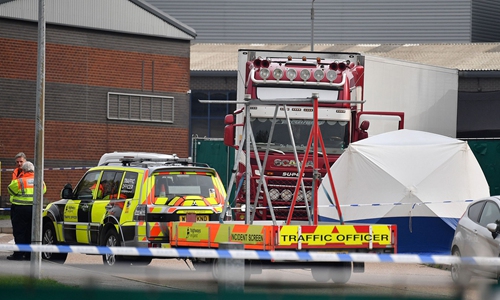HOME >> OPINION
UK lorry tragedy defies humanitarian image of European countries
By Cui Hongjian Source:Global Times Published: 2019/11/13 22:13:40

British Police officers stand on duty at a cordon near to where a lorry, and containing 39 dead bodies, that was discovered at Waterglade Industrial Park in Grays, east of London, on October 23, 2019. Photo: VCG
The Essex lorry tragedy in the UK where 39 undocumented Vietnamese migrants were found dead continues to receive worldwide attention after it first made headlines in October. Several media outlets and observers set their eyes on the victims, who may be defined by the UK as "illegal economic migrants" driven by their family conditions and their desire to begin a new life in Europe. However, very few have taken their destination into consideration or reflected on the role of Europe and the UK in the tragedy.The European industrial structure and demographic composition determined its utilitarian immigration policy, especially economic immigrants. After WWII, some European countries introduced immigration policies to attract young and middle-aged workers from developing countries. The move was aimed at reinvigorating their economies.
At first, the European countries hoped the immigrants could be used as economic tools and arrive as soon as they were called and then leave when their economies experienced a recession. In other words, the immigration policy was never about humanitarianism.
After realizing that economic migrants have formed a consolidated group featuring families, cultural and other non-economic relations, Europe reluctantly accepted the fact that economic immigrants planted roots on the continent.
From the end of the Cold War to the European debt crisis, globalization and the European economy that benefited from the phenomenon provided room for economic migration.
Meanwhile, Europe portrayed itself as a blessed continent that was politically tolerant, culturally diverse, and filled with economic prosperity and humanitarian intentions in efforts to boost soft power. During this time, it was tolerant toward economic immigrants and to some extent recognized their contributions to the European economy.
However, the European debt crisis in 2009 struck the continent's optimism. Europeans started to believe the immigrants were stealing job opportunities from local residents. In response to the sentiment, France, Germany and the UK, which used to welcome economic immigrants, attempted to abandon the policy of multiculturalism. Europe's attitude toward migrants started to change.
Panic swept Europe during the 2016 refugee crisis as the public feared that the migrants and refugees could have links with terrorists. As Europe raised the threshold for refugees and immigrants, some countries called economic immigrants illegal and labeled them "refugees."
Economic migrants who were once needed to improve Europe's development and international image have been abandoned due to the continent's sluggish economy, social division, and ethnic conflicts.
In 2016, the UN High Commissioner for Refugees said, "We are faced with an extremely alarming situation at the moment, with Europe on the cusp of a new and largely self-induced humanitarian crisis."
The routes taken by colonists in European history have to a large extent become the reverse roadmap of migrants entering Europe. Those who are unsatisfied with living conditions but have aspirations of leading a better life, those who share the same language with previous colonial powers in their countries and filled with fantasies of Europe are still trying to reach the continent, even though the economic opportunities, policy, and cultural tolerance Europe could provide them with is vanishing.
Many of the 39 Vietnamese victims who were lured by human smugglers were seeking opportunities on UK soil before Brexit. Although British elites were pessimistic about the prospects of the UK economy and employment, it did not stop greedy human traffickers or smugglers from promising migrants "better lives" in the country.
Given the lack of consensus, the EU has failed to find a solution for its refugee crisis. Meanwhile, each country has adopted tougher migrant policies. The "humanitarian" image of Europe will continue to be tested.
The author is director of the Department of European Studies, China Institute of International Studies. opinion@globaltimes.com.cn
Posted in: VIEWPOINT